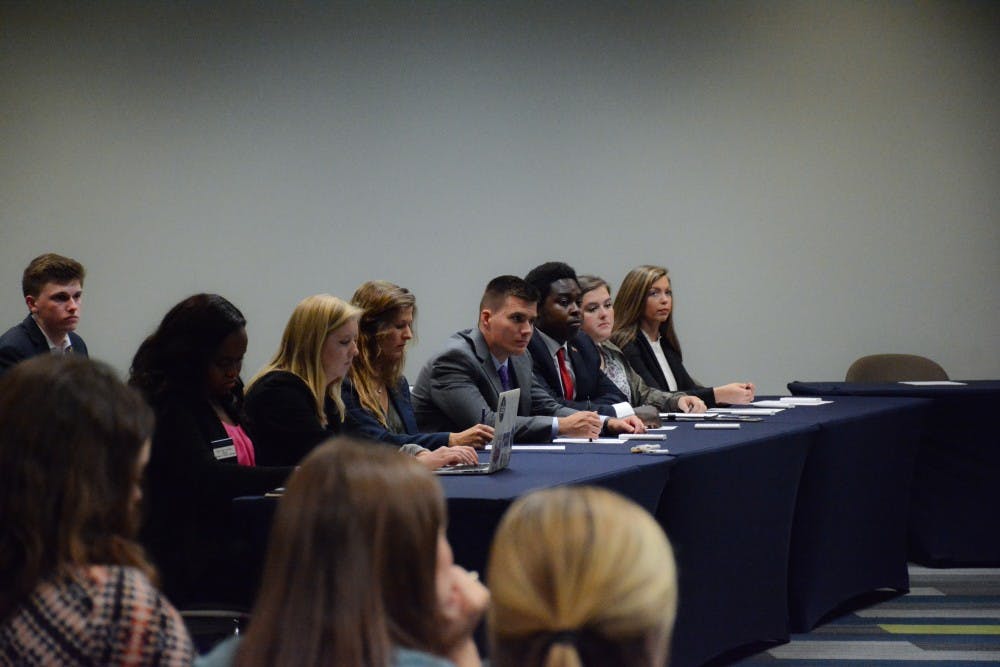In many ways, this week’s SGA Senate was out of the ordinary.
Senators held their meeting a day late on Tuesday, Jan. 22 in the Mell Classroom Building, where they attempted to amend their constitution to add 10 more seats in the Senate.
This was one of the two times per calendar year where senators could vote to amend the constitution, making Tuesday night a hard deadline.
The constitutional amendment was announced, and its purpose is simple: increasing the representation of Auburn students in Senate. Its implementation, however, was called into question by many senators.
According to Auburn’s Office of Institutional Research, Auburn has a senator to student ratio of 1 to 896.
The amendment would add 10 extra seats to SGA Senate, bringing the total from 34 senators to 44 senators.
However, these new seats would not be structured like the ones currently allocated. Instead, each of these 10 seats would represent an organizational category, based on those found in AU Involve.
There are 13 organization categories in AU Involve. The amendment would make Senate seats to represent 10 of these categories, including Greek, religious and spiritual, sports and recreational, Student Activity Organizations and cultural.
Any student in an organization that falls in one of these 10 categories — that also meets the general requirements needed to run for a Senate position — would be able to run for one of these seats.
For example, a student involved in the Honors College that also meets the requirements set for general Senate seats would be able to run for the seat allocated to the Honors category.
All students who are involved with an organization that falls into one of these 10 categories would be able to vote on other students running for the seat allocated to their organizational category; a student involved in Greek life would be able to vote on the Greek Senate seat.
Many senators were quick to point out faults in the amendment and call its validity into question.
Some senators said there could be a potential conflict within the religious and spiritual group, where the interests of one religious group could differ greatly from the interests of another.
The answer posed, mainly by Landon Kramer, senator for the College of Engineering, was that the main idea of this seat was to bring voice to the religious and spiritual community as a whole — not to highlight specific beliefs or theology of its constituents.
Senators expressed concern that organizations that hold a majority of a category might be guaranteed a seat each year.
Catherine Bryant, senator for the College of Business, gave an example of the Honors College, which would have a majority in the Honors category.
Senators also questioned the implications if a senator representing an organization was assigned to the Budget and Finance Committee, where they might be able to direct funds to their own organization.
This issue was addressed by senators pointing out that if a senator was found guilty of this, they could then be impeached if necessary.
James Sadie, senator for the College of Business, suggested a brief recess to organize arguments and consolidate questions.
After this recess and a recounting of attendance, it became apparent that there were not enough senators to pass an amendment.
The Senate needs four-fifths of its total members to be present in order to vote on a constitutional amendment.
One of the senators changed majors during their term, thereby forfeiting their seat.
So the four-fifths was calculated based off of 33 senators instead of the original 34.
The attendance needed to vote on a constitutional amendment was 26.4, rounded up to 27. After a set of recounts, it became apparent that the number of senators present was only 26.
As a result, even if every senator present voted to pass the proposed amendment, it could not be passed.
Even more, due to the fact that constitutional amendments can only be voted on twice per calendar year and only once per semester, this was the current Senate’s last opportunity to pass this amendment before their terms ended.
Some senators expressed visible frustration with this, but nothing could be done, said SGA Vice President Carlos Smith. The amendment was forced to be tabled indefinitely.
Do you like this story? The Plainsman doesn't accept money from tuition or student fees, and we don't charge a subscription fee. But you can donate to support The Plainsman.





